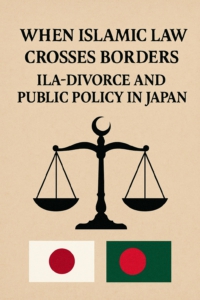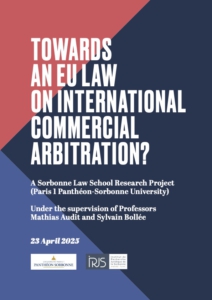The 2025 International Arbitration Survey: The Path Forward
“The 2025 International Arbitration Survey: The Path Forward”
Luke Nottage (University of Sydney)
The 14th Queen Mary University of London Survey, again in collaboration with international law firm White & Case, was dissected at an Australian launch seminar (expertly moderated by partner Lee Carroll) at their Melbourne office on 22 July 2025. Some “early insights” had been provided during Paris Arbitration Weeks, when the Survey report was not yet public. This analysis delves deeper into the report and key findings, drawing also on the discussion with our co-panellists, including some suggestions for future research.
Survey Methodology
This latest Survey shows how the responses have become more expansive and therefore reliable over time. Although not a random survey, 2402 responses were received for the written questionnaire (the response rate is unspecified). This is significantly greater than “more than 900” respondents for the 2022 Survey focused on energy disputes, 1218 for the general 2021 Survey, and just 103 for the inaugural Survey in 2006. This study was again mixed-method, adding qualitative research through 117 follow-up interviews.
This increase in Survey participation arguably indicates the growing awareness of the research and interest in its results, as well as the proliferation and diversification of international arbitration (IA) over the last two decades. Overall respondents in 2025 (Chart 26) primarily practiced or operated in the Asia-Pacific (47%), illustrating arbitration’s shift (along with economic activity) into Asia; separately in North America (a further 10% of respondents), Central and Latin America (7%); plus Europe (10%) and Africa (6%).
Respondents’ primary roles (Chart 23) were counsel (35%), arbitrators (17%), both (14%), arbitral institution staff (9%), academics (8%) and tribunal secretaries (2%). Surprisingly, there were few in-house counsel (3%), who historically and anecdotally tend to be more concerned eg about costs and delays. Few respondents were primarily experts (1%), which may reflect the declining professional diversity within IA.
Arbitration with or without ADR
The 2025 Survey asked again about respondents’ preferred method of resolving cross-border disputes (Chart 1). IA together with ADR was most popular (48%), compared to standalone IA (39%). The Survey contrasts this with 59% versus 31% in 2021 (p5). That shift could indicate that IA has been working effectively to address eg persistent complaints about its costs and delays.
However, more work needs to be done by IA stakeholders, as in the 2015 Survey only 34% of respondents had preferred IA with ADR, versus 56% preferring just IA. This indicates that the trend over the last decade remains towards combining IA with ADR. Additionally, future research could usefully ask what is meant by IA “together with ADR”. As co-panellist Leah Ratcliff remarked from her experience (now as in-house counsel in Australia), parties are more comfortable with clauses providing for (structured) negotiations rather than (potentially still quite expensive) mediation before IA. It would also be interesting to check respondents’ preferences regarding Arb-Med (arbitrators actively promoting settlement, or engaging an Arb-Med-Arb process as in Singapore – arguably showing up in the 2022 SIDRA Survey, Exhibit 8.1).
The 2025 Survey commentary also suggests that ADR preference may be partly “influenced by cultural factors” (p6), noting European respondents favoured more standalone IA (51%) compared Asia-Pacific respondents (37%). However, recall that overall 39% favoured IA anyway.
There also remains great diversity within Asia regarding legal culture – let alone general culture. For example, first there are common law jurisdictions (eg Singapore, Hong Kong, Australia) with strong traditions now of domestic mediation for commercial disputes, due to high costs and delays in litigation initially (and sometimes still). This carries over into more willingness to agree to multi-tiered clauses mandating even mediation before arbitration. Secondly, however, there are some common law jurisdictions in Asia (notably India, despite extensive court delays) with no such tradition of privately-supplied mediation services. Relatedly, their legal advisors and parties are more reluctant to propose Med-Arb clauses in international contracts (although they may agree to them if proposed, if obtaining other benefits through negotiations). Thirdly, civil law jurisdictions (like Japan, with more efficient courts plus some Court-annexed mediation, but also mainland China) also seem less amenable to Med-Arb clauses, although long comfortable with clauses providing for good faith negotiations prior to IA. In addition, there is even greater diversity across Asia regarding Arb-Med (basically only practiced intensively in China, partly in Japan).
Preferred Seats and Rules
Earlier surveys had started to identify Singapore, Hong Kong and mainland Chinese cities within top preferred seats, along with traditional venues like London and Paris. Yet it was unclear whether this reflected the growing proportion of Asia-Pacific (essentially Asian) respondents. The 2025 Survey helpfully helps to address this question. Globally, ie among all respondents (Chart 3), the most preferred seat is London (chosen, among up to five seats, by 34%), then Singapore and Hong Kong (31% each), then Beijing and Paris (19% each). However, London and Singapore were ranked in the top four for all regional respondents, and Paris too except for Asia-Pacific respondents (Chart 2). Otherwise, the European and Asia-Pacific respondents “show strong preferences for seats in their respective regions” (2025 Survey, p7).
Quite similarly, LCIA Rules (nominated globally by 25% of all respondents, again with up to five preferences) were preferred in all regions except the Asia-Pacific, while SIAC Rules (chosen by 25%) and UNCITRAL Rules (15%) were preferred for all regions except Central and Latin America (Charts 4 and 5). By contrast, HKIAC Rules (25%) were most preferred by Asia-Pacific respondents (36%), but not selected among top 5 preferences from respondents from other regions. As co-panelist (and experienced arbitrator) Michael Pryles noted at the launch seminar, Hong Kong and HKIAC Rules still benefit as a compromise for transactions and disputes involving mainland China. He also rightly suggested, as did an audience member, that asking about “preferences” may not give the full picture. This could be usefully compared with evolving actual practice, including arbitration case filings. Over 2024, for example, HKIAC handled 352 new arbitration cases (77% international) whereas SIAC handled 625 (91% international).
Co-panellist Diana Bowman, new Secretary-General of the ACICA, remarked that the ACICA Rules did not quite make Chart 5, despite the Australian Centre’s increased case filings in recent years. As a former Rules committee member (2004-2024), I added that arbitral institutions should not just be judged by case filing statistics. Those depend for example on geography, although there may be scope for Australia to focus on niches, such as the South America – Southeast Asia or South Asia trades, or (as Pryles also observed) specialist fields such as disputes over resources. In addition, improving Rules (and seats more generally) can allow local parties more credibly to propose them but then compromise in negotiations to obtain other contractual benefits.
Pryles also shared experiences and views about the growing impact on IA from sanctions on parties or participants. Notably, 30% of respondents noted that sanctions led to a different seat being chosen (Chart 6).
The 2025 Survey also found that 39% thought awards set aside at the seat should be enforceable in other jurisdictions (Chart 8), whereas 61% thought not. The 39% proportion is surprisingly high, as only French courts uniformly adopt this approach. Courts elsewhere will usually not enforce, unless there is some particularly egregious flaw regarding the seat court (such as proven corruption) or seat jurisdiction (such as legislation retrospectively impacting arbitration agreements or awards). Perhaps the 39% of respondents agreed with enforcement but only in such exceptional circumstances, which might then be separated out as a third possibility in future research. Meanwhile, this trend (and growing deference towards decision of seat courts instead upholding challenged awards) should reinforce the importance of carefully choosing the seat.
IA Enforcement and Efficiency
Past Surveys (and other research) typically identified enforceability of IA awards (and agreements), neutrality and expertise of arbitrators, flexibility in procedures, then privacy and confidentiality, as major advantages over cross-border litigation. The 2025 Survey innovated by focusing on the growing awareness and engagement in various public interest elements (eg environmental) even in commercial IA, including its perceived advantages instead of litigation. Arbitrator expertise (47%), avoiding local courts and laws (42%) and (broader?) neutrality (28%) were often chosen from among three options (Chart 15). Confidentiality was selected by 34% of respondents, which seems understandable given these are still commercial disputes (not ISDS arbitrations involving greater public interests and so already associated with more transparency). Enforceability of awards was only chosen by 32%, but this may reflect greater actual or anticipated problems with public policy or arbitrability exceptions to enforcement.
Then 2025 Survey also usefully drilled down into another commonly posed question: voluntary compliance with IA awards (Chart 7). Interestingly respondents said this happened similarly, almost always or often, for non-ICSID awards against states (33%) as for ICSID awards (34%), despite most of the latter involving the more delocalised ICSID Convention enforcement regime. Also surprisingly, good compliance for non-ICSID private awards was only reported by 40% of respondents. This may also indicate persistent question around “formalisation” and over-lawyering in IA, discussed more broadly under “efficiency and effectiveness” in the 2025 Survey (pp15-19).
Notably, respondents were asked to chose up to three options for processes that would most improve efficiency in IA (Chart 10). The most popular were expedited arbitration (50%, generating further questions) and early determination of unmeritorious claims or defences (49%). But there was also interest in non-binding pre-arbitral assessments by an expert (13%), mandatory settlement discussions (12%) or mediation (11%) in procedural timetables, and even “baseball arbitration” (11%). Interestingly, as this remains a hot topic for multi-tiered clauses, 7% chose “limiting grounds to challenge pre-arbitration ADR outcomes in arbitration proceedings” (rather than in court). Less surprisingly, as these impact on fees earned by counsel (the largest respondent group) and are rarely mentioned in arbitral Rules, only 1% picked “sealed offers” as a mechanism to improve efficiency.
The survey found “perhaps most surprisingly, given the respondents’ generally favourable view of combining arbitration with ADR, the option of multi-tiered dispute resolution clauses with mandatory ADR processes was included by fewer than 1% of respondents as one of their three picks. To some interviewees, ADR adds an unnecessary procedural layer. Others question the utility …” (p16). However, this low response rate arguably is due to the question’s phrasing, which asked about measures to improve efficiency in arbitration (not the overall dispute resolution process).
A final hot topic canvassed in the 2025 Survey concerns AI in IA (pp27-33). Pryles was skeptical about arbitrators delegating too much to Artificial Intelligence for their reasoning. Surprisingly, however, although 71% of respondents had never used AI for “evaluating legal arguments” in the past 5 years, for the next 5 years this was expected to drop to 31% (Chart 18). Admittedly, some of this may be done by lawyers and so less problematic than for arbitrators.
Less controversial is the existing use of AI for “document review” (never used so far by only 41%, expected to drop to 10%). However, that raises the question of whether an even more efficient approach would be for arbitrators to more pro-actively help identify the issues to be determined, and hence relevant evidence. The 2012 Survey (Chart 9) had found that to be the best means experienced to expedite arbitral proceedings, even when phrased as arbitrators doing this “as soon as possible after constitution” of the tribunal (which is more controversial than as the arbitration progresses, eg under the JCAA Interactive Arbitration Rules).
Conclusion
The 2025 Survey, especially combined with the earlier ones, provides a rich resource to understand current practices and concerns in IA. It also helps identify future opportunities and challenges, as well as promising ongoing research into this always-evolving field.






